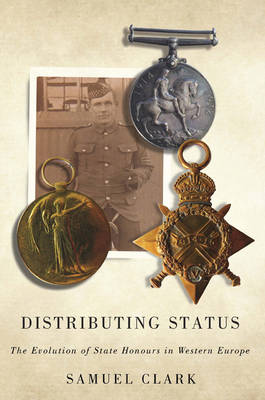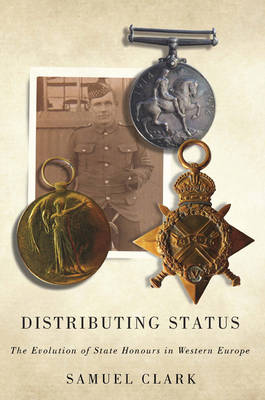
- Afhalen na 1 uur in een winkel met voorraad
- Gratis thuislevering in België vanaf € 30
- Ruim aanbod met 7 miljoen producten
- Afhalen na 1 uur in een winkel met voorraad
- Gratis thuislevering in België vanaf € 30
- Ruim aanbod met 7 miljoen producten
Zoeken
Distributing Status
The Evolution of State Honours in Western Europe
Samuel Clark
Hardcover | Engels
€ 77,95
+ 155 punten
Omschrijving
Honorific rewards are all about status and illustrate status processes in a way that few other social phenomena do. Why do we have so many honorific awards and prizes? Although they are a major feature of modern societies, they have received little scholarly attention. Samuel Clark argues that answering this question requires a separate historical analysis of different awards and prizes. He presents a comprehensive explanation of the origins and evolution of state honours in the British Isles, France, and the Low Countries. Examining cultural, social, and political changes that led to the massive growth in state honours and shaped their characteristics, Distributing Status also demonstrates their functions as instruments of cultural power, collective power, disciplinary power, and status power. Clark supports his conclusions with a cross-cultural statistical analysis of twenty societies. Lucid and logical, Distributing Status explicates an important historical change in Western Europe while at the same time contributing to several bodies of sociological literature, including evolutionary theory, theories of collective action, writings on discipline in modern societies, and studies of status processes.
Specificaties
Betrokkenen
- Auteur(s):
- Uitgeverij:
Inhoud
- Aantal bladzijden:
- 520
- Taal:
- Engels
Eigenschappen
- Productcode (EAN):
- 9780773546844
- Verschijningsdatum:
- 13/05/2016
- Uitvoering:
- Hardcover
- Formaat:
- Genaaid
- Afmetingen:
- 155 mm x 231 mm
- Gewicht:
- 907 g

Alleen bij Standaard Boekhandel
+ 155 punten op je klantenkaart van Standaard Boekhandel
Beoordelingen
We publiceren alleen reviews die voldoen aan de voorwaarden voor reviews. Bekijk onze voorwaarden voor reviews.








